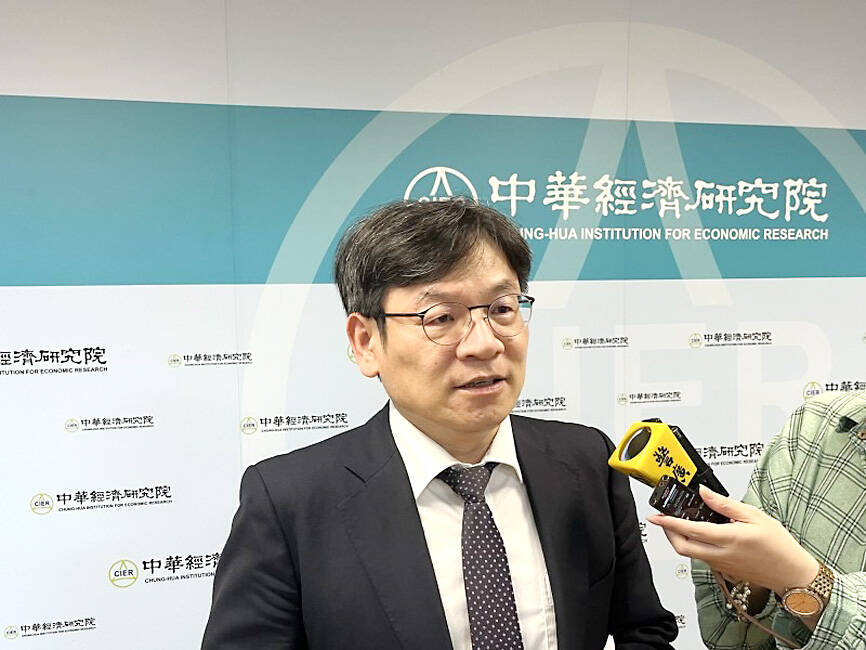The official manufacturing purchasing managers’ index (PMI) last month edged down 0.3 points to 46.8, falling for nine straight months, as companies remained cautious in the face of economic uncertainty, Chung-Hua Institution for Economic Research (CIER, 中華經濟研究院) said yesterday.
“Most constituents of the index moved by less than 1 point,” virtually unchanged from the previous month,” CIER president Yeh Chun-hsien (葉俊顯) told reporters.
PMI data aspire to capture the manufacturing industry’s health, with values of 50 and higher indicating expansion and scores lower than the threshold suggesting contraction.

Photo: Hsu Tzu-ling, Taipei Times
Although companies are still looking for clearer signs of a recovery, they are less pessimistic about business prospects in the coming six months, Yeh said.
The critical subindex of new business orders edged up 0.3 points to 48.6, closer to the neutral mark, as companies in the biotechnology, food and textile, as well as raw materials, saw business pick up, while other sectors remained weighed down by tepid end-market demand, CIER’s monthly survey found.
The reading on industrial production lost 1.2 points to 48.2, as some manufacturers cut capacity to save on operating costs. As a result, the employment measure dropped a mild 0.7 points to 47.9, the institute said.
The subindex on inventory declined an insignificant 0.1 points, while the measure on clients’ inventory fell 3.1 points to 41.6, reflecting a conservative and frugal attitude, the Taipei-based think tank said.
Although the worst is likely over, a concrete recovery remains elusive in terms of order visibility and other PMI data, Yeh said.
The value for the six-month business outlook gained 2.7 points to 42.5, it said.
Yeh attributed the sentiment uptick to China’s announcement of stimulus measures to bolster infrastructure, which would benefit local firms focused on the Chinese market.
The S&P Global Taiwan Manufacturing PMI reached similar observations, coming in at 48.3 last month from 47.6 in October.
The downturn in Taiwan’s manufacturing sector continued to ease, as companies exercised caution when making purchases to grapple with muted demand, S&P economics associate director Annabel Fiddes said, adding that the subdued demand placed a lid on price hikes for the time being, although inflationary pressures returned.
The nation’s non-manufacturers fared better with the non-manufacturing index (NMI) gaining 3 points to 56.2, the highest since August last year and expanding for 13 consecutive months, the institute said.
The tourism and hospitality sectors are looking forward to seasonally high sales linked to traditional year-end feasts and employee travel for the first time in four years without COVID-19 disruptions, Yeh said.
The TAIEX’s rally further shored up businesses for fund management and securities houses, the institute said.

Jensen Huang (黃仁勳), founder and CEO of US-based artificial intelligence chip designer Nvidia Corp and Taiwan Semiconductor Manufacturing Co (TSMC, 台積電) on Friday celebrated the first Nvidia Blackwell wafer produced on US soil. Huang visited TSMC’s advanced wafer fab in the US state of Arizona and joined the Taiwanese chipmaker’s executives to witness the efforts to “build the infrastructure that powers the world’s AI factories, right here in America,” Nvidia said in a statement. At the event, Huang joined Y.L. Wang (王英郎), vice president of operations at TSMC, in signing their names on the Blackwell wafer to

France cannot afford to ignore the third credit-rating reduction in less than a year, French Minister of Finance Roland Lescure said. “Three agencies have downgraded us and we can’t ignore this cloud,” he told Franceinfo on Saturday, speaking just hours after S&P lowered his country’s credit rating to “A+” from “AA-” in an unscheduled move. “Fundamentally, it’s an additional cloud to a weather forecast that was already pretty gray. It’s a call for lucidity and responsibility,” he said, adding that this is “a call to be serious.” The credit assessor’s move means France has lost its double-A rating at two of the

AI BOOST: Although Taiwan’s reliance on Chinese rare earth elements is limited, it could face indirect impacts from supply issues and price volatility, an economist said DBS Bank Ltd (星展銀行) has sharply raised its forecast for Taiwan’s economic growth this year to 5.6 percent, citing stronger-than-expected exports and investment linked to artificial intelligence (AI), as it said that the current momentum could peak soon. The acceleration of the global AI race has fueled a surge in Taiwan’s AI-related capital spending and exports of information and communications technology (ICT) products, which have been key drivers of growth this year. “We have revised our GDP forecast for Taiwan upward to 5.6 percent from 4 percent, an upgrade that mainly reflects stronger-than-expected AI-related exports and investment in the third

RARE EARTHS: The call between the US Treasury Secretary and his Chinese counterpart came as Washington sought to rally G7 partners in response to China’s export controls China and the US on Saturday agreed to conduct another round of trade negotiations in the coming week, as the world’s two biggest economies seek to avoid another damaging tit-for-tat tariff battle. Beijing last week announced sweeping controls on the critical rare earths industry, prompting US President Donald Trump to threaten 100 percent tariffs on imports from China in retaliation. Trump had also threatened to cancel his expected meeting with Chinese President Xi Jinping (習近平) in South Korea later this month on the sidelines of the APEC summit. In the latest indication of efforts to resolve their dispute, Chinese state media reported that